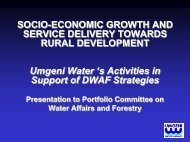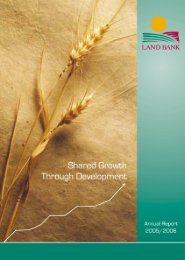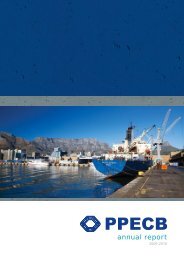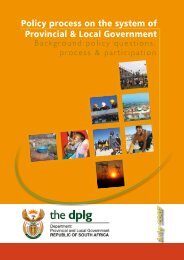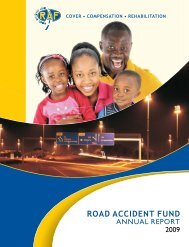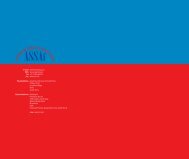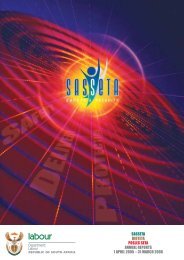Human Settlements Review - Parliamentary Monitoring Group
Human Settlements Review - Parliamentary Monitoring Group
Human Settlements Review - Parliamentary Monitoring Group
You also want an ePaper? Increase the reach of your titles
YUMPU automatically turns print PDFs into web optimized ePapers that Google loves.
<strong>Human</strong> <strong>Settlements</strong> <strong>Review</strong>, Volume 1, Number 1, 2010<br />
one of which is “Promoting vibrant urban areas,<br />
by encouraging job creation in internationally<br />
competitive manufactures and services,<br />
upgrading slums, and providing alternatives<br />
to slum formation” (UNDP 2005:64). The UN<br />
Millennium Project recommends that known<br />
interventions reaches the scale of investment<br />
needed to achieve the goals. The need to<br />
scale up arises from the limited impact of pilot<br />
projects implemented at local or district levels<br />
without a measurable impact on national<br />
indicators. National scale-up however remains<br />
a major institutional challenge requiring<br />
an intersectoral approach and a carefully<br />
designed multiyear planning framework.<br />
as approximately 2.1 million which translates<br />
to about 12 million South Africans still in<br />
need of a better shelter (Sexwale 2010).<br />
Government has budgeted R16-billion on<br />
subsidized housing for the 2010/2011 financial<br />
year. Fifty six per cent of households lived in<br />
formal dwellings in 2009 (StatsSA 2009:5) with<br />
13,4 per cent of households living in informal<br />
dwellings. The number of households living<br />
in ‘RDP’ or state subsidized dwellings was<br />
recorded as 12,8 per cent with an almost equal<br />
percentage of households having at least<br />
one member of the household on a demand<br />
database/waiting list for state subsidized<br />
housing.<br />
Progress toward achieving the Millennium<br />
Development Goals has been slow in Sub-<br />
Saharan Africa: one of the reasons for this<br />
is the “very slow diffusion of technology from<br />
abroad” (UNDP 2005:148). An essential priority<br />
for African economic development therefore is<br />
to mobilize science and technology targeted<br />
at Africa’s specific ecological challenges, i.e.,<br />
food, disease, nutrition, construction, and<br />
energy (UNDP 2005:156).<br />
South African Context<br />
Within the South African context, the South<br />
African population was recorded in the 2009<br />
Community Survey as 49 383 thousand with<br />
the total number of households recorded as 13<br />
812 thousand. The net population growth was<br />
recorded as 430,000 per annum.<br />
Government’s aim is to deliver 220,000<br />
subsidised houses per annum between<br />
2010 and 2014: the current backlog for state<br />
subsidized housing as of 2010 was reported<br />
Of those occupying RDP or state subsidised<br />
housing 16,1 per cent stated that the walls<br />
were weak or very weak and 14,9 per cent<br />
regarded their roofs as weak or very weak.<br />
More than 30 per cent of households in the<br />
Western and Eastern Cape reported problems<br />
with the quality of the roofs and walls (StatsSA<br />
2009:5).<br />
With regard to other infrastructures services,<br />
82,6 per cent of households are connected<br />
to the mains electricity supply: however, 24,8<br />
per cent (or one-in-four) of households still<br />
use wood or paraffin for cooking. While 89,3<br />
per cent of all households had on- or off site<br />
access to piped or tap water, only 42,1 per<br />
cent accessed their main source of drinking<br />
water from inside their dwelling. With regard to<br />
sanitation and waste removal, 6,6 per cent of<br />
households had no access to a toilet facility or<br />
were using a bucket toilet and 46,9 per cent of<br />
households do not have their refuse collected<br />
by the municipality.<br />
177



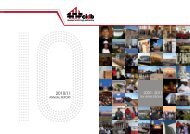
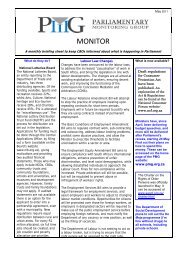
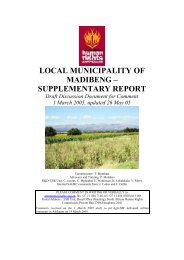
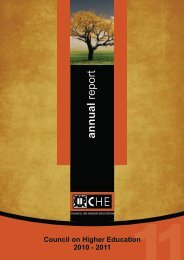
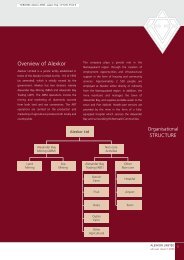
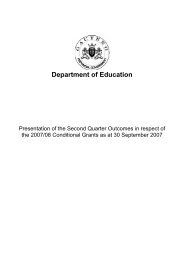
![National Research Foundation Annual Report 2008 / 2009 [Part 2]](https://img.yumpu.com/49774036/1/177x260/national-research-foundation-annual-report-2008-2009-part-2.jpg?quality=85)
